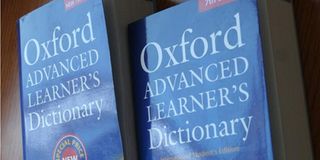Medium, datum and other singular words that we have chosen to ignore

Copies of Oxford Advanced Learner's dictionary. PHOTO | FILE | NATION MEDIA GROUP
What you need to know:
- Data, for example, is an everyday word in Kenya, whereas few Kenyans will ever have even heard of the singular forms datum.
- Certain English words give our communicators no end of grief.
- Our own journalists are the ones who lead our young language learners astray through atrocious grammar.
Throughout the English-speaking world, certain words, especially those with Greco-Latin roots, which, therefore, dominate the superstructure of English, are far better known in their plural than in their singular forms.
Data, for example, is an everyday word in Kenya, whereas few Kenyans will ever have even heard of the singular forms datum.
Since use is what determines a word’s longevity, medium, the singular form of the word media, is in danger of soon slipping out of our vocabulary and into oblivion.
For the media, our most important purveyors of civic information, daily mislead us on the difference between media and medium, the latter being the singular form.
But, even with only a smattering of Latin, you should know that the word media is plural and that medium its singular form.
Whereas The Nation and The Standard are media, each is only a medium. Often, the media themselves — including Kenya’s English-language radio and television stations — are the chief culprits in this.
ATROCIOUS GRAMMAR
Our own journalists are the ones who lead our young language learners astray through atrocious grammar and to malapropism, the misuse of vocabulary that an English novelist attributed to a certain Mrs Malaprop.
How is it that, in certain very important contexts, our daily media have largely forgotten the word medium, the singular form of media?
Yet this problem is found even among the British authorities who forced onto us not only English — an extremely troublesome language — but also the print and electronic forms of mediation.
So even journalists — who should be hired only on the basis of full mastery of the language of their newspaper’s choice — now habitually give plural significance to certain words of obviously singular significance.
We have become perennial victims of the woolly-headedness characteristic of the Civil Service.
SINGULAR FORMS
Yet certain plural words are far better known than their singular forms. Every civil servant knows the word data. But none seems to have heard of the singular form datum.
Yet the plural forms of certain Greco-Latin words are unknown even to English-language journalists, for whom English is what Shakespeare called “the be-all and the end-all here”.
For instance, data is far less known than datum, its singular form.
Certain English words give our communicators no end of grief. Although media is decidedly plural, our own media have never heard of it as a plural word.
The singular form medium is practically unknown in our newsrooms, where the word media has long deposed it from its rightful place in the comity of singularities.
Philip Ochieng is a retired journalist. [email protected]





